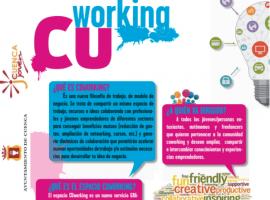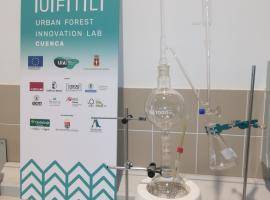Gonzalo, you are personally involved in the implementation of UFIL. Which is FSC role in the project? Is it a merely educational one?
FSC educational role in the innovation lab is the most evident, and we are contributing as planned with our internal resources and the use of contractors to the activities of the lab. Still, the most important aspect for us is the entrepreneurial one and I have been working constantly to build the timber market in and around UFIL. For example, FSC has involved IKEA in proposing a challenge during the second course of the innovation lab. It has also involved Lignum Tech, a manufacturing company created by Vía Ágora. Lignum Tech is setting in Cuenca a production site for assets addressed to the real estates’ market. It will use local wood, thus creating demand for quality wood in the province and impacting directly through the employment of some 60 people. Besides our efforts to develop a construction value chain around the project, FSC keeps supporting some of the new companies created by UFIL’s participants (i.e., Cambium, Nemetona and Dendrum) through networking and identification of market opportunities.
Apart from the educational and entrepreneurial roles of FSC, it is evident that forest certification has an environmental role. Provided that Cuenca is the only province in Castilla-La Mancha having certified public forests, the most common certification (over 51,000 hectares) is PEFC (Programme for Endorsement of Forest Certification). Still, recently, the regional administration started pushing for the dissemination of FSC. In April 2021, the regional government of Castilla-La Mancha approved the provision of technical assistance for the dissemination of FSC across the region, starting from the provinces of Cuenca, Guadalajara and Toledo. The aim is to give a seal of quality management to the region's forests which represent almost half of the region’s total area. FSC Forest Management certification was granted to 11 public forests of the Province of Cuenca, out of which seven are owned by the Municipality of Cuenca. This adds to the first FSC certification of Ecosystem Services granted to one of the city’s forests (‘Los Palancares y Aggregados'), and to the FSC Chain of Custody certification granted to the municipal wood factory ACMSA (ACMSA is also a partner in UFIL). Overall, the city has now 20,000 hectares that are FSC certified. Additional 16,000 hectares are FSC certified in other municipalities of the province (i.e., Las Majadas, Huelamo, Talayuelas and Tragacete) (Ayuntamento de Cuenca, 2022; UFIL blog, 2022). Gonzalo, is the presence of FSC in UFIL part of this bigger picture of regional expansion?
We expect to certify shortly some more 10,000 hectares. This will bring to 45,000 hectares the area of Castilla-La Mancha that is FSC certified for forest management. As mentioned earlier, our interest in consolidating FSC certification in the region was one of the reasons why we participated in the project. But this consolidation would have not been possible without the political willingness of regional and local (i.e., the Cuenca ’s City Hall) public authorities. There are also areas where we would have liked to progress further, but that are still immature. For example, we would have liked to involve private forest owners/managers so as to increase the quality of their wood output; to bring value to the construction value chain of the City of Cuenca - and we presented to the City Hall a public procurement programme towards this goal; and to develop a business case for the Palancares forest area based on its certified ecosystem services so as to get concrete value and benefits for the territory. But this last aspect is not that easy, considering that in Europe a business model for ecosystem services does not exist, yet.
Will FSC keep on pushing all these processes after the completion of UFIL?
These processes are part of our routine work, but, honestly, our capacity was significantly strengthened by the funding received through UFIL, allowing us to focus also on key areas such as the development of a certified wood value chain.


























